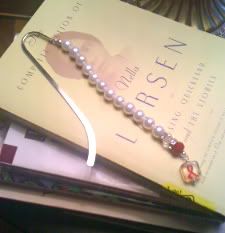Without a doubt, the African-American students in the class said that Job's story is about our faithfulness and God's reward because of that faithfulness. It seemed like a reasonable answer and it was what I had always been taught growing up in the church. "If you just hold on like Job," the minister would holler from the pulpit, "God will bless you just like Job." At the center of the Job story for many African-Americans was this idea that everybody has a cross to bear, but if you just hold on God will bless you in the end.
During slavery we took the slave master's religion and appropriated it for our suffering. For example, we told Mary not to weep because Pharaoh's army got drowned in the Red Sea. We understood the Israelites liberation meant that God could do it for us one day too. We cried, "Go down Moses, tell old Pharaoh to let my people go." We made the Bible work for us. In the Judeo Christian tradition we saw our suffering and deliverance through the life of the Israelites. God blesses the faithful.
But in the face of what I call Gold Card Christianity, (Name it and Claim it) New Age thinking, Prosperity Ministry, have we taken this way to far? I mean I hear so many half quoted, out of context scriptures and positive thinking quotes I sometimes want to scream.
You know how they go: Ask and you shall receive; Weeping may endure for a night, but joy is coming in the morning. I even heard Joel Osteen say the other day,"Famine first, then favor. So just tell yourself, everything is going to be alright." So is he saying that God will only bless me if I have hardship first? These off the cuff quotes sometimes wrapped in creative sermons go on. "Without a test there is no testimony." But, I'm confused, isn't waking up in the morning without any adversity a testimony too? Is a testimony only rooted in suffering? Sometimes when I hear these quote, I have mixed emotions.
Like the other day I heard a quote and I was like, YES! "The olive does not yield it's best oil, unless it is crushed. When God wants to use a man greatly he is often crushed greatly #yield." At that moment I was being crushed and it made sense. On the back of having to put my 16 year doggie under, pneumonia, being behind in all of my bills to the point that groceries was an amenity, shitted on myself in public, and then my baby Sophie had to have a cyst cut out of her butt, I was at my lowest. In a instant there was some level of understanding for my suffering in this quote.
But then I started to really process it all. Really think about what that quote meant and how it could help me make sense out of my right now suffering. I started to really think about olives. I asked some fundamental questions. Aren't olives good just as they are? Do we need to have olive oil? Olives in God's creation don't need to be crushed. The crushing is man's doing. So why do we give God credit for what man has done? Even some of these situations we find ourselves in are not so much about God but about us and our use of free will.
But then it is also true, sometimes bad things happen to good people and it makes no sense. A young woman loose her baby. A family is hit with cancer hard in one year. Kids are born with HIV to mothers with HIV that didn't do all that she should have done to prevent it. Why should that child pay for that mother's choices?
Yes, it's hard. But how people deal with other people's tragic situations is not always in the best of ways. I can't image someone would think it's comforting to tell a young woman who just lost of child that she is still young enough to have another child. How do we make sense of it all, when one day you have a child and the next day you don't? Is it a greater testimony to say I lost my child but God kept my uterus in tact so I can have another child, or to say that my child was born healthy and lived a long life?
Or when I shit on myself in public and have to wash up in a cold toilet in an ice cream parlor, that this humiliation had to happen because God wants to use me for a great work. How does that take away my pain and humiliation at that moment? How does that make me feel good about myself, or even God. Isn't God loving? Why would He want to break my spirit to build me back up? Wouldn't He want to build on an already strong spirit, build on the greatness of the creation He has already made?
All these questions are good ones and equally as good as God's word. But do we take God's word out of context to help explain the unexplainable? To help us understand the complexity of suffering? Or is it the easy way out, the easiest thing to say in a difficult situation? But why not just say, "I'm sorry, baby, that this has happened to you, can I give you a hug?" Why try to explain it?
But explain it is what we do. That day in Bible class we were all shocked when our professor said, "Job is really about how big God is and how little we are." It's not about faithfulness, it's about God and how He has the right to give and to take away and you may never understand it so stop trying to explain it or question it.
All we can do is be accountable to ourselves. Job's faithfulness was about his relationship with God, not so much what God will do, but what we should do. And in the end, it may work out to our advantage, but it may not. I often wonder what we would have thought of God if Job continued his course and there was no blessing at the end? Is a blessing required because we love God and are faithful to His word?
It's all so complicated. And honestly, I don't have answers. I know for sure that there is suffering in this world. And I know for sure, it does not always work out the way we want it to. And I know for sure that sometimes a goodness happens out of a bad situation that we could never explain no matter how hard we may try.
Yes, slaves took the Bible and made it their own. The Israelites were our shinning example of God's deliverance. But what we fail to remember is that after liberation from bondage they wondered in the wilderness for 40 long years. They made the best out of a bad situation. They didn't always have the answers and sometimes they just lamented.
Which is another shining example of the Israelites that we never seem to use. It's OK to lament and to feel the pain of your right now situation. It's not for me to say how long is long enough that one should lament. One's pain cannot be measured against another persons pain. How one copes and makes it through a difficult time is for them and about them. In the end all we can do is love and support unconditionally.
It seems shallow and insensitive to me, to throw around all these saying in such a way that they are supposed to have some sort of magic for us. That I can will my hunger away when I have no food or money to buy food. Or I can find joy in the fact that I had to wash my panties in a toilet of an ice cream parlor.
How often have I been told, "Girl, just remain faithful, like the three Hebrew boys and you will come out of the furnace and won't even smell like smoke." HUH? For Real? is what I really want to say to people. But in the end, I understand that story very well. Yes, the Hebrew boys were delivered from the furnace, but they still stayed in bondage right there in Babylon. What a contradiction. Awww, go on, search the Bible all night long to see if I'm telling the truth. God lifted them up in their bondage, but they were still in bondage nonetheless. I've thought about suffering a lot, and in the end, I cannot make sense of what seems senseless.






 Tea began as medicine and morphed into a beverage of choice!
Tea began as medicine and morphed into a beverage of choice!


 I don't quite remember when I fell in love with tea but I do remember the most
I don't quite remember when I fell in love with tea but I do remember the most  Until recently I had never drank Peppermint Tea made with loose leaves. And Honestly, I will probably never go back. The freshness of loose Peppermint Tea cannot be denied. When I open the can of
Until recently I had never drank Peppermint Tea made with loose leaves. And Honestly, I will probably never go back. The freshness of loose Peppermint Tea cannot be denied. When I open the can of 

 I love to read! Inside a book I escape into someone else's life. There is something wonderful about turning to the next page of a wonderful story. Something intoxicating about the smell of the book and the story it brings to life. Reading brings me joy, and these days with my health in the balance, I find solace in my books.
I love to read! Inside a book I escape into someone else's life. There is something wonderful about turning to the next page of a wonderful story. Something intoxicating about the smell of the book and the story it brings to life. Reading brings me joy, and these days with my health in the balance, I find solace in my books.









